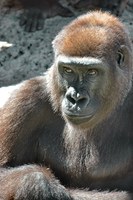ABQ BioPark Welcomes New Gorilla, Says Farewell and Good Luck to Gorillas and Giraffes
Moves are all part of Species Survival Plans recommended by the Association of Zoos and Aquariums.
May 24, 2019 - The ABQ BioPark has welcomed and said farewell and good luck to several animals this spring.
Two gorillas and two giraffes have been matched with new mates around the country, and a new gorilla is now calling the BioPark home. All of the moves are part of each animal's Species Survival Plan (SSP), recommended by the Association of Zoos and Aquariums (AZA).
Departures:
- Tulivu, a female Western lowland gorilla, left the ABQ BioPark last month for the Cincinnati Zoo as recommended by the Gorilla SSP. She is being integrated into one of Cincinnati's three gorilla groupings and will hopefully reproduce someday.
- Tusa, a female Western lowland gorilla, left Albuquerque on May 10 for the Cleveland Metro Parks Zoo in Ohio. She joins a troop of five gorillas and is recommended to breed. Unfortunately, Tusa did not breed at the ABQ BioPark. With the change of location, the SSP team hopes she will successfully breed in her new troop.
- Two of the ABQ BioPark's seven giraffes recently departed for other AZA institutions. Jambazi, a male reticulated giraffe, left the ABQ BioPark on April 29 for the Cape May County Zoo in New Jersey. He is recommended to breed in his new herd. Malika, a female reticulated giraffe, left Albuquerque on May 1 for the Lincoln Children's Zoo in Nebraska. She is also recommended to breed in her new herd.
Arrivals:
- The ABQ BioPark welcomed Samantha, a Western lowland gorilla on April 22. She came from the Glady's Porter Zoo in Texas. The 12-year-old female is recommended to breed with the BioPark's silverback, Marcus. She will be introduced to Huerfanita, Matadi and Marcus after she completes a mandatory quarantine period.
Accredited zoos and SSPs work together to protect animals. Organized by AZA, SSP programs match animals to maintain genetic diversity. The BioPark participates in SSPs for 29 different species.

